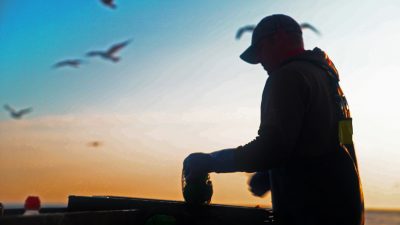
On a small Atlantic island to the northeast of Maine, the lobster population has flourished in recent years. Fishermen’s catches have been bountiful, but behind the ample catches lies warring fishing boats and an international dispute.
It is here that lies the last land-border dispute between Canada and the United States. “Lobster War: The Fight Over the World’s Richest Fishing Grounds” documents the territorial conflict between Canada and America in which both countries lay claim to Machias Seal Island, the region near the Gulf of Maine surrounded by lobster-rich waters, according to documentary’s trailer.
As the Gulf of Maine’s temperature has increased, large populations of lobsters have migrated to the area.
With the full support of their government, both Canadian and American fisherman flocked to this lobster-rich island to assert sovereignty over the area. A competition between the fisherman soon erupted, leading to an increasingly violent conflict that the New Hampshire Film Festival dubbed, “a lobster fisherman’s war zone.”
WBUR’s new event venue, CitySpace, will host a screening of the award-winning, feature-length documentary, on Wednesday, March 6, at 6:30 p.m. Tickets can be purchased online for $15 each.
“Lobster War” highlights the impact of climate change on political and economic issues, said David Abel, the film’s director and a Pulitzer Prize-winning reporter from The Boston Globe.
“This is a story that reflects how climate change isn’t some distant threat,” Abel said in an interview. “It is having an impact on lives today.”
Abel said he learned about this issue while covering a story for the Globe. The article, published in 2015, detailed the sabotage, theft and death threats that were born from the conflict.
“The conflict was intriguing to me in part because it reflected how the warming waters of the Gulf of Maine — which are warming faster than nearly any other body of water on the planet — was exacerbating a centuries-old border dispute,” he said.
Abel collaborated with Andy Laub, an award-winning documentarian with whom he had worked on a 2017 Discovery Channel documentary called “Sacred Cod.”
Greg Marinovich, a journalism professor in Boston University’s College of Communication, said he believes that on one hand, documentaries reach a rather limited audience. When covering such an informative topic, he said, it becomes difficult to gather attention.
“The problem is not many people watch documentaries,” Marinovich said. “They’re seen as self-righteous or too wordy. People just want to be entertained.”
In an effort to reach a wider audience, Abel said he contacted his colleagues at WBUR to hold a screening.
“When I learned about CitySpace, I thought it would make a great venue to screen the film,” Abel wrote in an email. “I hope to chat with people about the film, and the implications of climate change.”
Marinovich said an advantage of documentaries is that audience members feel more participatory.
“For films covering education propaganda, if you will, I think documentaries are the best medium,” Marinovich said. “You can put in graphs and multiple voices and visuals.”
After the screening, audience members will have an opportunity to engage in conversation with Abel and Barbara Moran, the senior producing editor for WBUR’s environmental vertical. Moran said she hopes this discussion will lead to greater coverage of the environmental and social issues included in the film.
“I honestly knew nothing about this topic before seeing the film, so I expect it will be an eye-opener for many in the audience,” Moran wrote. “I hope they come away understanding that the effects of climate change are real, and local, and happening now – and this story is one example of that.”


















































































































